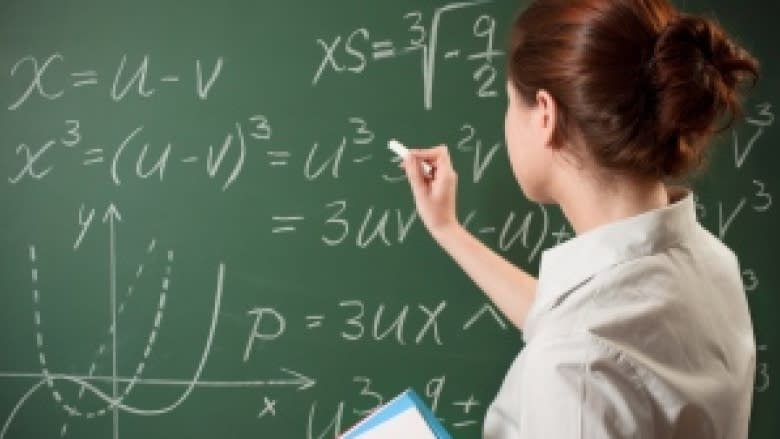Educators debate whether some math basics are 'a dead issue in the year 2016'

When it comes to improving the math skills of Ontario students, the $60 million recently pledged by the province will likely just make matters worse, suggests University of Manitoba mathematics professor Robert Craigen.
"Guess what, you've just funded the ideas that are already causing the problems," he said.
In fact, says Craigen, when you look at the spending on math education per pupil across Canada, there's an inverse relationship — provinces spending the most are getting the worst results.
The problem, says Craigen and other critics of the math curriculum being used across the country, are teaching methods that de-emphasize learning the basic skills. Multiplication tables, long division, adding and subtracting big numbers and computing fractions — these fundamentals, critics say, are being minimized in the classrooms.
"There are even parents we are hearing from in Ontario saying 'I taught my child how to add down columns and the teacher sent a note home saying please stop teaching the old algorithms to the students because it's harming them,'" he said.
Instead, the focus has been placed on the so-called discovery or inquiry method of learning, where memorization is discouraged and the teacher is more of a guide to encourage students to try different ways to figure out problems, often using materials like blocks or drawing pictures.
"For 17 years, kids came to my class and watched me do mathematics," Al Overwijk, an Ottawa math teacher recently told CBC News. "But now I'm coming to work and watching them work and trying to help them and guide them."
Discovery method gone too far
While some measure of discovery is important in math, the use of the method in classrooms has gone too far, according to Anna Stokke, an associate professor of mathematics at the University of Winnipeg.
Stokke, who co-founded with Craigen the Western Initiative for Strengthening Education in Math, wrote a report last year for the C.D. Howe Institute titled What To Do About Canada's Declining Math Scores.
She noted that, according to one international study, Canadian students' math performance in all but two provinces declined between 2003 and 2012. And in several provinces, the percentage of students performing at the lowest levels in math significantly increased while the percentage of students performing at the highest levels significantly decreased.
The culprit, she said, was too much discovery method teaching. Her solution was to go back to the basics. She prescribed an 80/20 split — 80 per cent of the math class spent on direct learning and 20 per cent on discovery-based techniques.
"Teachers who wish to use discovery-based teaching techniques should consider doing so conservatively; the instructional balance should always favour direct instruction," she wrote.
However Marian Small, founder of the University of New Brunswick's Mathematics Education Centre, and an advocate of the discovery method, says if math scores are down, it's in part due to teachers who have not fully made the transition to the discovery method.
But it's also a reflection of the North American "I don't have time for anything, I don't want to be bored," culture, she says.
"Kids are less patient to do things that they used to do and that has nothing to do with curriculum. That has to do with how people are," says Small.
'Get out a calculator'
Small says that, while she too believes in teaching the basics, it's how children learn those basics that needs to be rethought.
"There used to be one way to do it and now we think there's more than one way," she said. "I think we have to decide what are the basics in the year 2016 as opposed to what were the basics a bunch of years ago."
Small, who prefers "problem-based" over the term discovery-based, says the method gives kids a problem and opportunities to figure it out for themselves before someone tells them how to do it.
"Whether a kid can do that long multiplication, I think that's a dead issue in the year 2016," she says.
"I do not think we need a lot of people who can multiply three, two-digit numbers or two, three-digit numbers because if you're going to do that, you get out a calculator."
But Craigen rejects Small's assertion.
That sort of skill "is an important benchmark in the development of an overall conception of how numbers and arithmetic work, in preparation for algebra, which is the gateway in high school to the higher mathematical disciplines they will see in college," he says.
"It's long been settled that the establishment of basic facts, in memory, and the development of automatic skills for the most basic tasks is really of fundamental importance in developing long-term skills."


